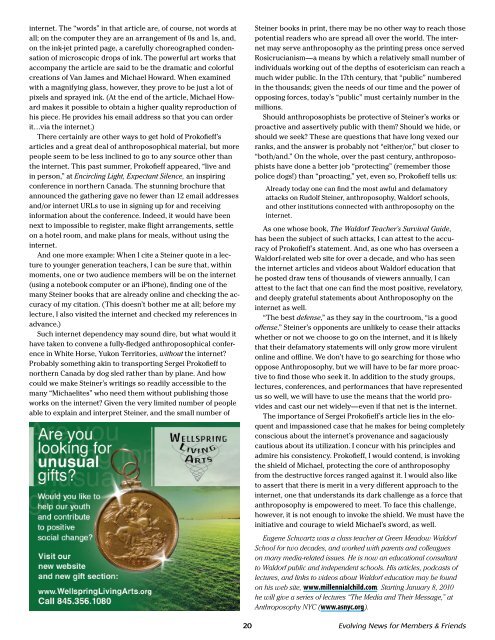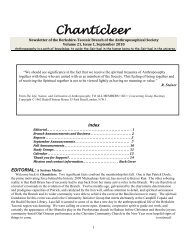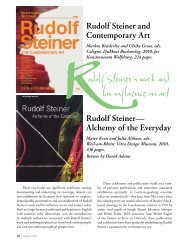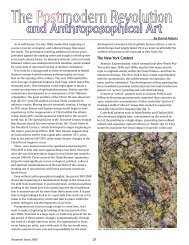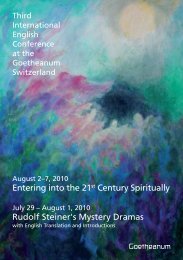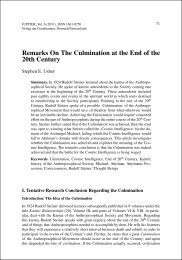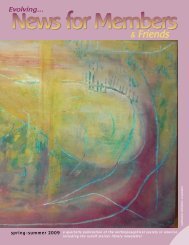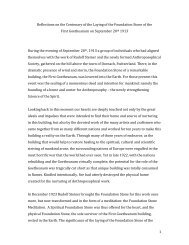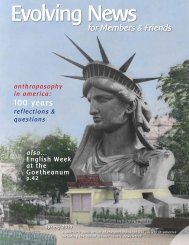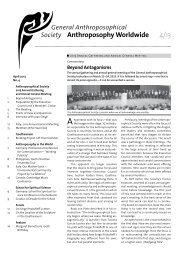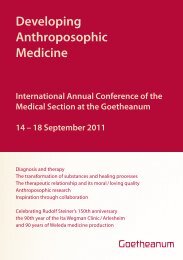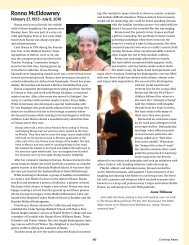& Friends - Anthroposophical Society in America
& Friends - Anthroposophical Society in America
& Friends - Anthroposophical Society in America
You also want an ePaper? Increase the reach of your titles
YUMPU automatically turns print PDFs into web optimized ePapers that Google loves.
<strong>in</strong>ternet. The “words” <strong>in</strong> that article are, of course, not words atall; on the computer they are an arrangement of 0s and 1s, and,on the <strong>in</strong>k-jet pr<strong>in</strong>ted page, a carefully choreographed condensationof microscopic drops of <strong>in</strong>k. The powerful art works thataccompany the article are said to be the dramatic and colorfulcreations of Van James and Michael Howard. When exam<strong>in</strong>edwith a magnify<strong>in</strong>g glass, however, they prove to be just a lot ofpixels and sprayed <strong>in</strong>k. (At the end of the article, Michael Howardmakes it possible to obta<strong>in</strong> a higher quality reproduction ofhis piece. He provides his email address so that you can orderit…via the <strong>in</strong>ternet.)There certa<strong>in</strong>ly are other ways to get hold of Prokofieff’sarticles and a great deal of anthroposophical material, but morepeople seem to be less <strong>in</strong>cl<strong>in</strong>ed to go to any source other thanthe <strong>in</strong>ternet. This past summer, Prokofieff appeared, “live and<strong>in</strong> person,” at Encircl<strong>in</strong>g Light, Expectant Silence, an <strong>in</strong>spir<strong>in</strong>gconference <strong>in</strong> northern Canada. The stunn<strong>in</strong>g brochure thatannounced the gather<strong>in</strong>g gave no fewer than 12 email addressesand/or <strong>in</strong>ternet URLs to use <strong>in</strong> sign<strong>in</strong>g up for and receiv<strong>in</strong>g<strong>in</strong>formation about the conference. Indeed, it would have beennext to impossible to register, make flight arrangements, settleon a hotel room, and make plans for meals, without us<strong>in</strong>g the<strong>in</strong>ternet.And one more example: When I cite a Ste<strong>in</strong>er quote <strong>in</strong> a lectureto younger generation teachers, I can be sure that, with<strong>in</strong>moments, one or two audience members will be on the <strong>in</strong>ternet(us<strong>in</strong>g a notebook computer or an iPhone), f<strong>in</strong>d<strong>in</strong>g one of themany Ste<strong>in</strong>er books that are already onl<strong>in</strong>e and check<strong>in</strong>g the accuracyof my citation. (This doesn’t bother me at all; before mylecture, I also visited the <strong>in</strong>ternet and checked my references <strong>in</strong>advance.)Such <strong>in</strong>ternet dependency may sound dire, but what would ithave taken to convene a fully-fledged anthroposophical conference<strong>in</strong> White Horse, Yukon Territories, without the <strong>in</strong>ternet?Probably someth<strong>in</strong>g ak<strong>in</strong> to transport<strong>in</strong>g Sergei Prokofieff tonorthern Canada by dog sled rather than by plane. And howcould we make Ste<strong>in</strong>er’s writ<strong>in</strong>gs so readily accessible to themany “Michaelites” who need them without publish<strong>in</strong>g thoseworks on the <strong>in</strong>ternet? Given the very limited number of peopleable to expla<strong>in</strong> and <strong>in</strong>terpret Ste<strong>in</strong>er, and the small number ofSte<strong>in</strong>er books <strong>in</strong> pr<strong>in</strong>t, there may be no other way to reach thosepotential readers who are spread all over the world. The <strong>in</strong>ternetmay serve anthroposophy as the pr<strong>in</strong>t<strong>in</strong>g press once servedRosicrucianism—a means by which a relatively small number of<strong>in</strong>dividuals work<strong>in</strong>g out of the depths of esotericism can reach amuch wider public. In the 17th century, that “public” numbered<strong>in</strong> the thousands; given the needs of our time and the power ofoppos<strong>in</strong>g forces, today’s “public” must certa<strong>in</strong>ly number <strong>in</strong> themillions.Should anthroposophists be protective of Ste<strong>in</strong>er’s works orproactive and assertively public with them? Should we hide, orshould we seek? These are questions that have long vexed ourranks, and the answer is probably not “either/or,” but closer to“both/and.” On the whole, over the past century, anthroposophistshave done a better job “protect<strong>in</strong>g” (remember thosepolice dogs!) than “proact<strong>in</strong>g,” yet, even so, Prokofieff tells us:Already today one can f<strong>in</strong>d the most awful and defamatoryattacks on Rudolf Ste<strong>in</strong>er, anthroposophy, Waldorf schools,and other <strong>in</strong>stitutions connected with anthroposophy on the<strong>in</strong>ternet.As one whose book, The Waldorf Teacher’s Survival Guide,has been the subject of such attacks, I can attest to the accuracyof Prokofieff’s statement. And, as one who has overseen aWaldorf-related web site for over a decade, and who has seenthe <strong>in</strong>ternet articles and videos about Waldorf education thathe posted draw tens of thousands of viewers annually, I canattest to the fact that one can f<strong>in</strong>d the most positive, revelatory,and deeply grateful statements about Anthroposophy on the<strong>in</strong>ternet as well.“The best defense,” as they say <strong>in</strong> the courtroom, “is a goodoffense.” Ste<strong>in</strong>er’s opponents are unlikely to cease their attackswhether or not we choose to go on the <strong>in</strong>ternet, and it is likelythat their defamatory statements will only grow more virulentonl<strong>in</strong>e and offl<strong>in</strong>e. We don’t have to go search<strong>in</strong>g for those whooppose Anthroposophy, but we will have to be far more proactiveto f<strong>in</strong>d those who seek it. In addition to the study groups,lectures, conferences, and performances that have representedus so well, we will have to use the means that the world providesand cast our net widely—even if that net is the <strong>in</strong>ternet.The importance of Sergei Prokofieff’s article lies <strong>in</strong> the eloquentand impassioned case that he makes for be<strong>in</strong>g completelyconscious about the <strong>in</strong>ternet’s provenance and sagaciouslycautious about its utilization. I concur with his pr<strong>in</strong>ciples andadmire his consistency. Prokofieff, I would contend, is <strong>in</strong>vok<strong>in</strong>gthe shield of Michael, protect<strong>in</strong>g the core of anthroposophyfrom the destructive forces ranged aga<strong>in</strong>st it. I would also liketo assert that there is merit <strong>in</strong> a very different approach to the<strong>in</strong>ternet, one that understands its dark challenge as a force thatanthroposophy is empowered to meet. To face this challenge,however, it is not enough to <strong>in</strong>voke the shield. We must have the<strong>in</strong>itiative and courage to wield Michael’s sword, as well.Eugene Schwartz was a class teacher at Green Meadow WaldorfSchool for two decades, and worked with parents and colleagueson many media-related issues. He is now an educational consultantto Waldorf public and <strong>in</strong>dependent schools. His articles, podcasts oflectures, and l<strong>in</strong>ks to videos about Waldorf education may be foundon his web site, www.millennialchild.com. Start<strong>in</strong>g January 8, 2010he will give a series of lectures “The Media and Their Message,” atAnthroposophy NYC (www.asnyc.org).20 Evolv<strong>in</strong>g News for Members & <strong>Friends</strong>


